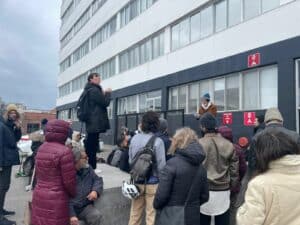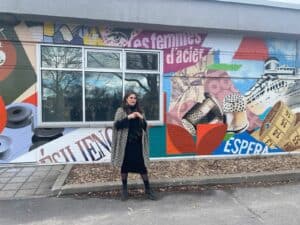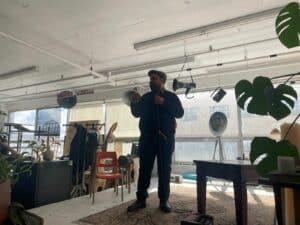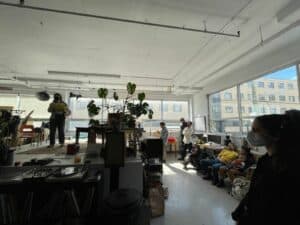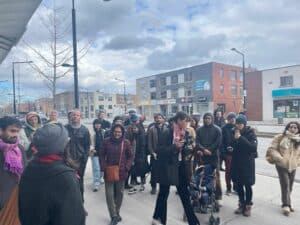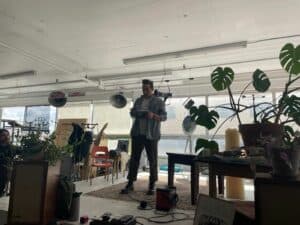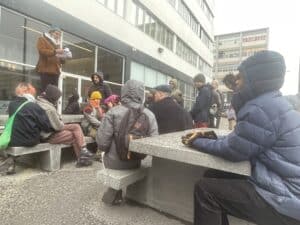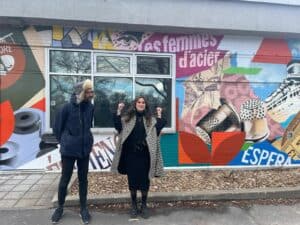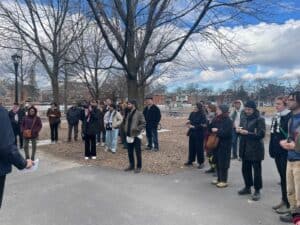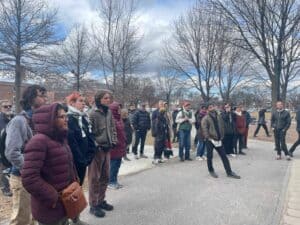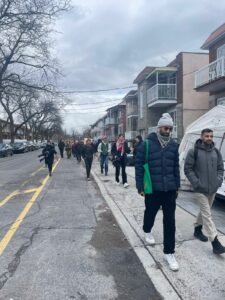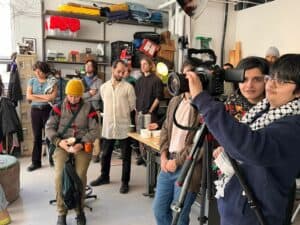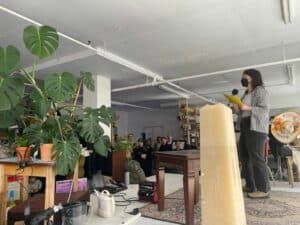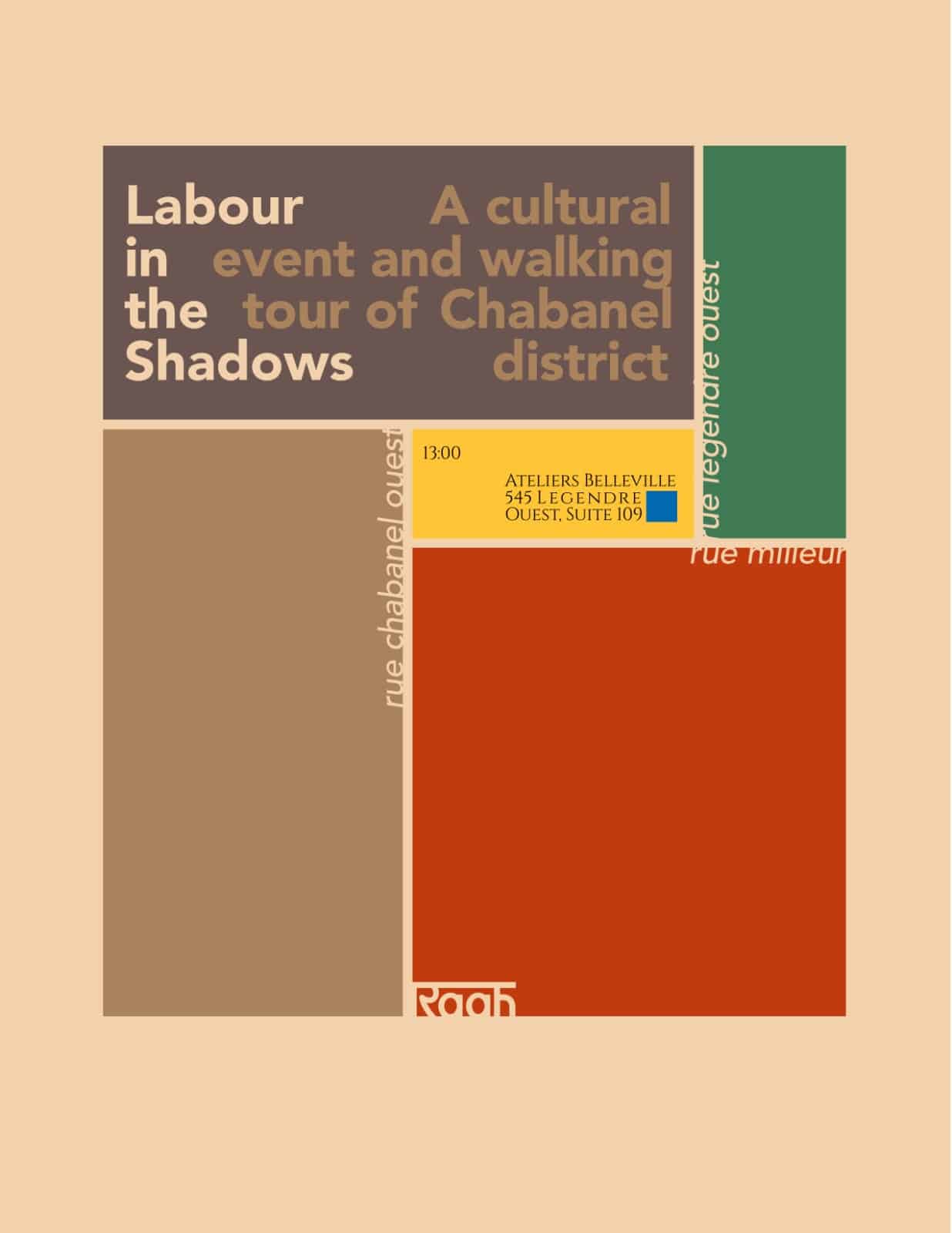
A community walking tour taking place within Montréal’s garment district (Cité de la Mode) that will largely revolve around Chabanel street. As this area of the city is being directly targeted by the Projet Montreal administration for gentrification, largely through the opening of funding for the transformation of former textile industry buildings into artist studios. It is now essential to understand the political textures of this area and the history of grassroots labour struggles that have taken place in the area.
This event will start with a cultural event in Suite 109 at Ateliers Belleville and then a walking tour in the district. There will be a set of performances in Ateliers Belleville and then presentations throughout the walking tour.
This popular walking tour aims to contextualize the shifts in industrial textile production in the city, the intentional outsourcing of garment sector jobs by Québec corporations who have utilized Quebec regulations that favor outsourcing to shift major production to locations in the global south where workplace labour conditions are more favorable for corporate profit. Specific existing corporations such as Lamour Inc. faced in recent years grassroots pressure and organizing for workplace justice.
In 2007, immigrant workers at the Montreal-based garment manufacturer Lamour were “unceremoniously laid-off” after having worked at the company for decades. As the company prepared to shutter its domestic production activities, Lamour gradually laid off nearly 500 of its Montreal-based workers starting in 2006. The gradual nature of layoffs was strategic: had Lamour decided to close its factory all at once, they would have had to pay their workers collective layoff benefits. During this period, workers publicly denounced the abysmal labour conditions at Lamour, where they had been locked inside the factory during the night shift, forced to eat meals at their workstations, and were not paid when their machines broke down and they failed to meet their quotas. And, to worsen Lamour employees’ situation, their union was widely understood to be a pro-management or company union that did not advocate for workers’ real demands.
Over 2007 and 2008, laid off workers and community organizers at the Immigrant Workers Centre (IWC) engaged in a struggle to gain compensation for laid off Lamour employees. They jointly pressured the Labour Relations Tribunal (Tribunal administratif du travail) and the Labour Standards Board (Commission des normes, de l'équité, de la santé et de la sécurité du travail, CNESST), demanding that the layoffs be treated as collective so that workers could receive fair compensation. In the end, many Lamour employees received an increased benefits package.
Featuring presentations and performances by:
Nikczar Aguirre is a community organizer and member of the Immigrant Workers Centre. Nikczar is active within the Filipino diaspora and writes songs that speak to struggles for justice in Canada, the Philippines and beyond.
Trumpet player Philippe Battikha has reoriented his practice to sound art, converting objects and spaces in order to examine our visually-dominant environment and our ability to lend an ear to what surrounds us. For Battikha, the notion of contamination is central: sound has the capacity to “threaten” space since it travels through walls and barriers. The political dimension of listening techniques and uses is thus sketched out in a work that builds on experimental music and the creation of sound installations and sound objects. Battikha is a founding member of the independent music label Samizdat Records and the collective Jean Couteau, as well as the artist-run spaces L'envers (Montreal) and 80V (Brooklyn, NY). He has presented work at the Musée national des beaux-arts du Québec (Quebec City, Qc, 2016); Alt Space LOOP (Seoul, Korea, 2022); Espace F (Matane, Qc, 2022); The Little Gallery of San Bernardino (California, USA, 2020); FOFA Gallery (Montreal, Qc, 2019).
Mostafa Henaway, a Canadian-born Egyptian, is a long-time community organizer at the Immigrant Workers Centre in Montreal, where he has been organizing for justice for immigrant/migrant workers for over two decades. He is also a researcher and PhD candidate at Concordia University.
Lauren Laframboise is a PhD student at the Centre for Oral History and Digital Storytelling in the Department of History at Concordia University, and a student affiliate of the Deindustrialization and the Politics of Our Time (DePOT) project. Her research explores the impacts of deindustrialization in the apparel industry in Montréal and New York City. She is also the External Affairs Officer for the Concordia Research and Education Workers’ Union (CREW–CSN).
Martín Rodríguez, transmission artist, educator, and member of Atelier Belleville.
Joseph Sannicandro is a writer and artist based in Montreal, studying creative labor and (un)popular culture, with a particular attention to sound. His dissertation explores the nature of doing things together through a cultural history of aesthetics and politics in post-1968 Italy. His work has appeared in publications including eContact, dpi., Carceral Notebooks, The Journal for Sonic Studies, Cultural Critique, and in edited book collections. He is co-founder of the music blog A Closer Listen, and producer of the Sound Propositions podcast.
Gaurav Sharma is a community organizer and artist living in Montréal. Over the last years Gaurav has been an organizer at the Immigrant Workers Centre and has particularly focused on creating theatre within the South Asian diaspora, creating multiple plays that speak to migrant worker experiences.
Yumna Siddiqi, a member of the IWC board and an associate professor of English at Middlebury College.
